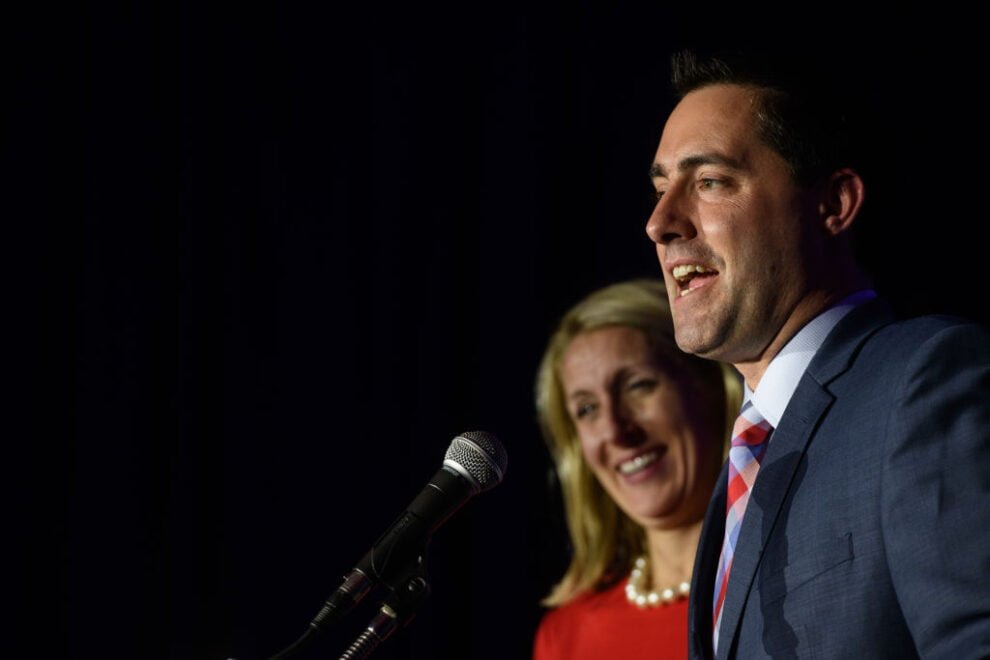Ohio Secretary of State Frank LaRose’s fledgling U.S. Senate campaign is facing a complaint filed with the Federal Elections Commission. The complaint alleges LaRose violated campaign finance law by delaying his official filing and coordinating with an outside political group.
When is a candidate a candidate?
People seeking a federal office like the U.S. Senate officially become a candidate when they raise or spend $5,000 in that effort. The same $5,000 cap applies to third parties spending on a candidate’s behalf as well.
Once a candidate, the clock starts ticking for an individual to file a statement of candidacy with the Federal Election Commission. They have 15 days to file, and their primary committee has another 10 days to post its disclosures. Candidates also face limits on how much money they can raise from individuals and groups.
So-called “testing the waters” provisions, though, complicate those requirements. Potential candidates can go well beyond that $5,000 ceiling to explore their bid through polling and other activities. The catch is, once they are a candidate, they have to retroactively report that spending.
When was LaRose a candidate?
Secretary LaRose publicly announced his candidacy July 17, but his intentions were among the most poorly kept secrets in Ohio politics.
Ten days before his announcement he posted a blurry version of what would eventually be his campaign logo on Twitter. Months before that, NBC News reported LaRose was telling donors he was planning to join the race soon.
Around the same time, the Columbus Dispatch noted he was encouraging donors to give to Leadership for Ohio Fund, an outside political group closely associated with LaRose.
The FEC complaint, filed by Cleveland Tea Party founder Ralph King, zeroes in on those early May communications. King contends LaRose knew then he was going to run, and so he was “outside the lines of testing the waters,” when he was raising money through Leadership for Ohio Fund.
“That money was raised for the purpose of Frank LaRose running for Senate,” King argued. “He was doing it deceitfully, he was doing it knowingly, that he was going to be a Senate candidate, and he was doing it to skirt FEC rules of testing the waters.”
LaRose’s campaign did not respond to a request for comment.
King’s complaint alleges the 15-day clock for filing with the FEC should’ve started back when LaRose was assuring donors his entry was imminent. It cites a line of precedent stretching back decades, that after a person crosses that $5,000 spending or fundraising threshold, they become a candidate once they make a “private determination” to run.
Attached to King’s complaint is an undated “strategic overview” of the 2024 U.S. Senate Race, which makes the case for LaRose’s candidacy with his picture in the corner. Among the bullet points, it takes potshots at other GOP candidates. It argues 2024 “is not the year for a first-time statewide candidate” and “self-funding candidates haven’t worked” in the past.
“He wasn’t testing the waters,” King said, “he was doing fricking high dives.”
Given LaRose’s months of shadow campaigning, King’s complaint states, there’s “ample reason to believe that LaRose, directly or through third parties, has raised or spent in excess of the $5,000 threshold to qualify as a ‘candidate.’”
Leadership for Ohio Fund
LaRose may be the only candidate in the Republican field to win a statewide race and the only one to receive former President Donald Trump’s endorsement previously, but he’s still looking at some difficult math. Entrepreneur Bernie Moreno already has GOP U.S. Sen. J.D. Vance’s endorsement and Trump encouraged him to run. Trump has not endorsed yet for the 2024 Ohio Republican U.S. Senate primary. Both Moreno and GOP state Sen. Matt Dolan also have substantial personal fortunes to lean on.
That’s where Leadership for Ohio Fund comes in.
The conservative lawyer David Langdon organized the tax-exempt group in March under section 527 of the Internal Revenue Code. He’s also behind the 501(c)(4) Protect Women Ohio leading the campaign against this November’s reproductive rights amendment.
A 527 group can raise unlimited funds and it can spend on campaigns and lobbying efforts at the federal, state or local level. There’s no ceiling on a 527 organization’s campaign spending either, but they can’t coordinate or contribute to federal candidates.
They’re forbidden from “expressly advocating” for a federal candidate. But that doesn’t mean they can’t burnish a candidate’s reputation or criticize their opponent’s.
One additional hitch is that unlike 501(c)(4)’s, which do not have to disclose their donors, 527 organizations must file periodic reports with the IRS explaining who donated and how much. Because it was organized earlier this year, Leadership for Ohio Fund has yet to file. The next IRS deadline is July 31.
With its relatively loose restrictions on fundraising and spending, a 527 organization can be very attractive for a candidate looking to raise money from wealthy donors in that gray area before officially declaring their candidacy.
And Leadership for Ohio wasn’t simply operating as a receptacle for contributions — it was actively laying the groundwork for LaRose’s campaign. King’s complaint notes the group funded and then publicized polling suggesting LaRose was best positioned to challenge incumbent U.S. Sen. Sherrod Brown, D-OH.
So what’s next?
The complaint asks the FEC to impose “civil penalties sufficient to deter future violations,” but King doesn’t stop there.
“Any money,” he said, “that this PAC raised with Frank LaRose should not be allowed to be spent in any way shape or form on Frank LaRose’s primary or, if he’s the nominee, general election campaign.”
The nonpartisan Campaign Legal Center is a watchdog group that closely monitors campaign spending issues among others. They don’t weigh in on FEC complaints filed by other people or organizations. But they have pursued cases and won judgements against candidates with a similar set of circumstances.
Former Wisconsin Gov. Scott Walker stood up the 527 organization Our American Revival in 2015 as part of his bid for the 2016 GOP presidential nomination. That group helped Walker establish a campaign presence in Iowa and New Hampshire and fund his efforts to cultivate donors. The FEC eventually determined there was reason to believe Walker violated campaign finance rules. They dismissed the matter without taking enforcement action because the case had taken longer than the statute of limitations to complete.
More recently, the FEC fined former New York City Mayor Bill DeBlasio $53,100 in connection with his failed 2020 Democratic presidential bid. In that case as well, two 527 groups helped get DeBlasio’s campaign off the ground. But once he announced his candidacy, DeBlasio’s failure to reimburse those expenditures meant they amounted to illegal in-kind contributions.
Source: Ohio Capital Journal












